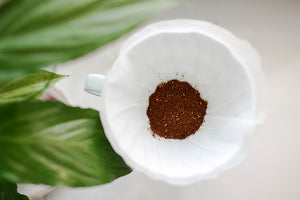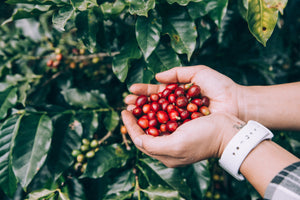
Bean review: Nude
In this week’s bean review, Phil Wain brews four coffees from East London roasters, Nude.
Nude Espresso began roasting in 2008 and their reputation has never been higher than today. This week we review their special Varietal set from Hacienda Sonora in Costa Rica where Nude has worked with producer Diego Guardia to prepare specific coffee varietals. Each lot has been grown and processed in the same way (natural processing, sun dried on raised beds for 12 days) and roasted to the same profile to allow us to directly compare the effects of genetics on the coffee. As far as we know this is the first set of its kind in the UK.
The subject of coffee varieties is a fascinating one for enthusiasts and if you have time and interest, head roaster Richard Williams recommends this video tutorial from Peter Giuliano, formerly of Counter Culture Coffee.
Arabica coffee originated in Ethiopia and southern Sudan, and of the many thousands of native varieties, only one (Typica) was exported around the world for commercial coffee production. Over the years this has produced varieties both by mutation and by deliberate cross-breeding. New varieties can increase disease resistance and yield and may produce different tastes.
Costa Rica, Sonora,Lot 1:Venecia
Venecia is a rare varietal derived in Costa Rica from Caturra (a high yielding dwarf Bourbon) which is slower to mature and more resistant to heavy rainfall. It is developed to give a better tasting crop and lower altitudes. On opening the bag, a biscuity - almost Rich Tea - aroma was present. At first, this sweet coffee tastes of chocolate, hazelnuts and pecans with relatively low acidity. As it cools a different character emerged: juicy strawberry, cherry, plum and red apple.
Varietal: Venecia | Process: Natural | Phil's tasting notes: chocolate, pecan, hazelnut, strawberry, cherry, plum and red apple
£8.00 for 250g via www.nudeespresso.com
Costa Rica, Sonora, Lot 2: Villa Sarchi
Villa Sarchi is a natural Costa Rican mutation of the Bourbon varietal that produces small plants with very high yields. This is the sweetest and juiciest of the coffees. It has a gorgeous red fruit smell when dry and a lovely soft mouth feel with notes of strawberry and raspberry with a touch more acidity than the other varietals tasted. This is a superb naturally processed coffee.
Varietal: Villa Sarchi | Process: Natural | Phil's tasting notes: strawberry, raspberry and super-sweet
£8.00 for 250g via www.nudeespresso.com
Costa Rica, Sonora, Lot 3: Red Bourbon
Red Bourbon is a variety of Bourbon with deep red coffee cherries. Bourbon itself naturally mutated from the Typica variety on the island of Réunion, formerly Bourbon, off the coast of Madagascar. It is prized for its sweetness and produces a higher yield than Typica. This coffee is well balanced, sweet with a mild apricot acidity and plenty of red fruit: raspberry, red apple and redcurrant.
Varietal: Red Bourbon | Process: Natural | Phil's tasting notes: raspberry, red apple, red currant, apricot
£8.00 for 250g via www.nudeespresso.com
Costa Rica, Sonora, Lot 4: Red Cataui
Red Cataui is a red fruit variety of Cataui. Catuai is a Brazilian hybrid of Caturra (itself a mutation of Bourbon) and Mundo Novo (a natural hybrid of Typica and Bourbon). Catuai combines the high yield and disease resistance of Mondo Novo with the dwarf high-yield qualities of Caturra. (Phew!) This varietal offers mostly traditional naturally processed coffee tastes. By far the funkiest, it has a banana aroma when dry and when brewed, brown sugar and delicious red apple, cherry and apricot notes. A strawberry acidity comes into its own as it cools.
Varietal: Red Catuai | Process: Natural | Phil's tasting notes: brown sugar, red apple, cherry, apricot, strawberry
£8.00 for 250g via http://www.nudeespresso.com/
More information is available via Nude’s blog.
Clearly, genetics do play a big part in taste judging by the differences here. However the broadly similar tastes reflect the effect on the varietals of terroir, processing, farming and roast profile (in this case very light).



